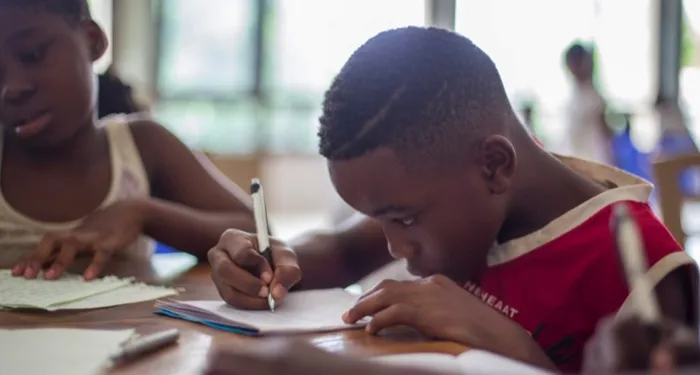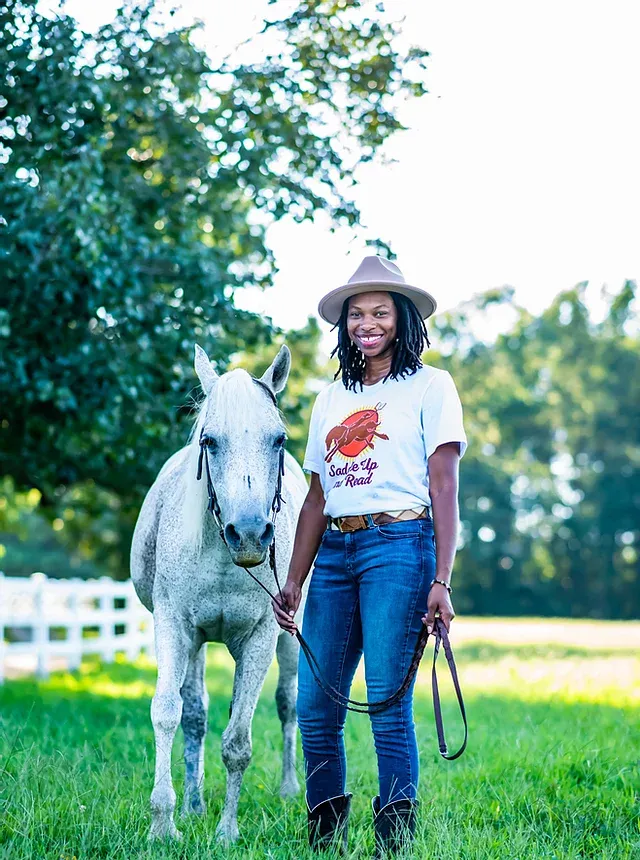
Saddle Up and Read Improves Kids’ Literacy One Farm Trip at a Time
Every weekend, Caitlin Gooch drives from her home in Virginia to Wendell, North Carolina, with a trailer full of books, a horse, and one goal: to get children reading. Over the weekend, she meets with families in neighborhoods and community centers, passing out books, letting children pet and read to her horse, and talking to parents and guardians about how to instill a love of reading in their children.
I recently spoke with Gooch, the executive director of Saddle Up and Read, a nonprofit organization that uses equine activities to help children engage with books and reading. Pre-coronavirus, Gooch and her friend, Abriana, would don their cowgirl outfits and visit classrooms in the Wendell area to read to children, answer questions about horses and equestrians, and encourage them to check out books from their school library. If the school or daycare center allowed for it, they would bring along a miniature horse. During the last two Black History Months, Saddle Up and Read visited over 100 classrooms in North Carolina to teach children about Black equestrians and read books about horses.
The idea for Saddle Up and Read started in a classroom. After working with elementary school children for about five years, Gooch noticed a problem: children were struggling to read words that were far below their grade level. The children she was working with would struggle to spell four-letter words, regularly fail quizzes, and showed little interest in reading the books available to them.
“So I literally stayed up that night in 2017 until two o’clock in the morning. And I was in tears because the data that I found is that Black children are so far behind their white peers and other minority races when it comes to literacy,” Gooch said.
Her idea was to use her family’s horses in a way that makes reading fun and accessible, specifically for Black children struggling with reading more than their peers. With the help of the local elementary school librarian, Gooch created a raffle for students who checked out three or more books to win a trip to her family’s farm. In the first month, they received over 180 entries.

After that Gooch, a mother of three, decided to open up her farm for parents to bring their children on weekends. “I had books that they could read, but they would bring their own. And they would pick a horse to read to whether the horse in the stall or the horses that I had out in the round pen,” Gooch said. “They would be eating hay and the kids are reading to them and touching their neck and touching their face.”
Literacy rates in America are among the lowest compared to other developed nations. The National Center for Educational Statistics finds that nearly two-thirds of all American 4th graders are reading below grade level. Illiteracy has a direct effect on a person’s health and employment, and is an early indicator of a person’s likelihood of living in poverty or living within the criminal justice system. Saddle Up and Read aims to intervene at an early age when feelings toward reading and books are malleable enough for children to develop a strong affinity for reading and thus improve literacy rates.
Another primary ambition for Saddle Up and Read is to expose more children to books and stories about Black equestrians. Of the 60 books Gooch found on the topic during the course of her research, many were university textbooks or focused on slavery and discrimination. What she found was missing were books encouraging Black children to learn about agriculture, to ride horses for fun or for sport, and ones featuring Black children engaging with horses. Determined to start fixing that problem herself, Gooch recently created a coloring book about trailblazing Black equestrians.
Saddle Up and Read is currently mobile due to COVID-19. Gooch has created a GoFundMe for people to donate money or order from her Amazon wish list, and she posts regular updates about items she needs on her Twitter account. In the future, she says she hopes to expand to a larger farm of her own, building out a full equestrian center with an on-site library.
Gooch also wants to enlist reading specialists to help parents understand the best ways to improve their children’s literacy. Right now, she says, she tells parents that reading to their children for 20 minutes per day is one of the best ways to boost their vocabulary and introduce new words. Doing funny voices while reading, putting on a show, and asking children questions about the story will help kids associate reading with enjoyment and improve reading comprehension.
For now, the focus remains on getting children excited about reading, sparking a love for horses and farm life, and boosting representation in books provided to kids in schools and at home. “If you put a book in front of a child and the characters look like them, whether it’s their skin color, their hair type, if there’s a character that has a wheelchair or has a hearing aid, or is doing something that they’re interested in, it’s going to draw them in,” Gooch said.
“So that’s what made me say, ‘Hey, let’s get books into these homes because if we’re not doing it, who’s going to do it’.”











